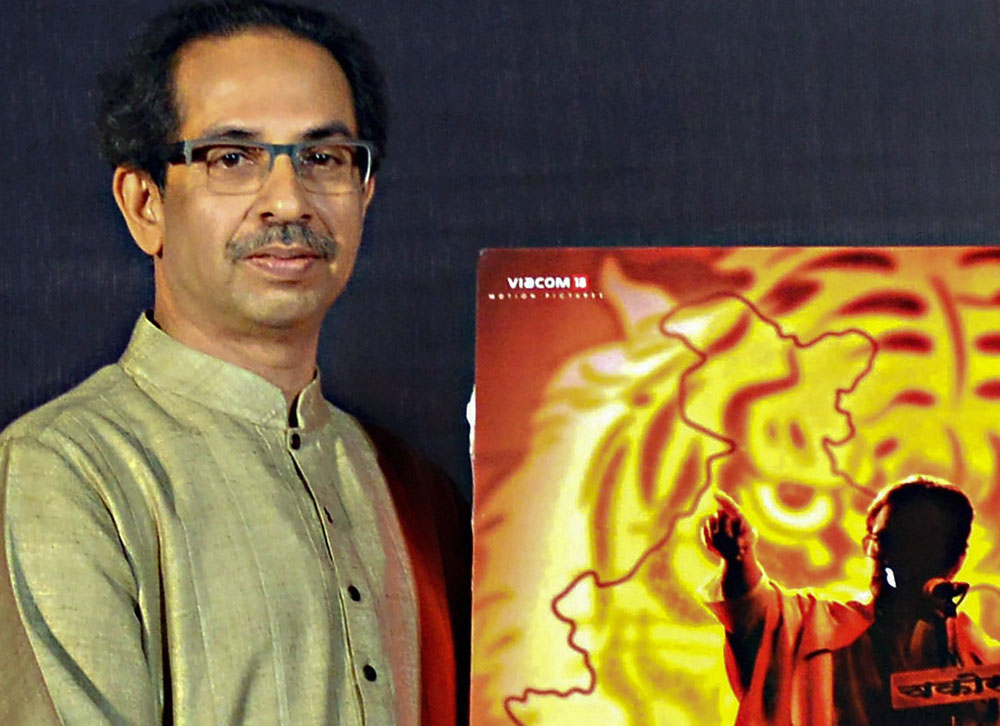The Shiv Sena, known for throwing tantrums ahead of the release of movies it perceives as a threat to its vision of India, is getting a taste of its own bitter medicine and refusing to swallow the potion.
The Central Board of Film Certification, loosely known as the censor board, has ordered cuts in a biopic of the Sena’s founder, Bal Thackeray, including a reference to the Babri Masjid that was demolished in 1992.
“Yes, they have raised objections to four dialogues and two scenes. Balasaheb (as Thackeray was addressed) spent more than 50 years in social and political life. He has been depicted as he was, there is no need for objections,” said Sanjay Raut, the Shiv Sena parliamentarian who wrote the script of Thackeray, The Film and produced it.
“Balasaheb was controversial. What he said and did are in the records. We have not made it up. He spoke about protecting the rights of the locals, all the regional parties are doing that today. He has been shown like he was. This is not a love story. No cuts or changes will be made to the film,” Raut said.
Calls this newspaper made to CBFC regional officer Tushar Karmarkar went unanswered. The trailer of the film was released on Wednesday.
Without clearance from the CBFC, no film can be exhibited in theatres.
The film’s producer, Raut in this case, has the option of holding talks with CBFC officials to reach a compromise.
Another option is to take legal recourse — as former censor board chairperson Pahlaj Nihalani did last month after cuts were suggested in his film Rangeela Raja.
Nihalani and Raut are now finding themselves on the same side in the sense that the former censor board chief was often accused of advocating unreasonable cuts when he controlled the scissors.
On the Thackeray controversy, Nihalani told reporters that the film should be released without any cuts. “The film is on Balasaheb. There is no vulgarity, no cuss words…. What is there to censor?” he asked.
According to sources, the CBFC, now headed by Prasoon Joshi, has objected to a reference to the Babri Masjid and another to the south Indian community in Mumbai, along with a couple of more deletions.
The film, with Nawazuddin Siddiqui in the title role, is scheduled to be released on the Shiv Sena leader’s birth anniversary on January 23, 2019.
Thackeray had formed the Shiv Sena in 1966 to protect the rights of the children of the soil, which was perceived as a backlash against the growing south Indian population in what was then Bombay. Over the next decades, the Sena took the shape of a hardline group championing the Hindutva cause associated with the Sangh parivar.
In its 52 years of existence, the Sena has often stood against creative freedom with its trademark street violence.
Ahead of the release of Mani Ratnam’s Bombay, a special screening was held for Thackeray, and some scenes depicting a character resembling the Sena leader were chopped.
Shiv Sena supporters had stormed cinemas in Mumbai and stopped the screening of Deepa Mehta’s Fire.
At times, the Sena’s threats have spread beyond the borders of Mumbai and Maharashtra. Ahead of the release of the Shah Rukh Khan-starrer Raees, the Sena’s Chhattisgarh unit had threatened exhibitors. Similar warnings were issued ahead of another SRK film, Dilwale, released in 2015.
Salman Khan, who shares a good rapport with Prime Minister Narendra Modi, had earned the Sena’s ire ahead of his hit Bajrangi Bhaijaan. The Sena had also supported a ban on Sanjay Leela Bhansali’s Padmaavat.











